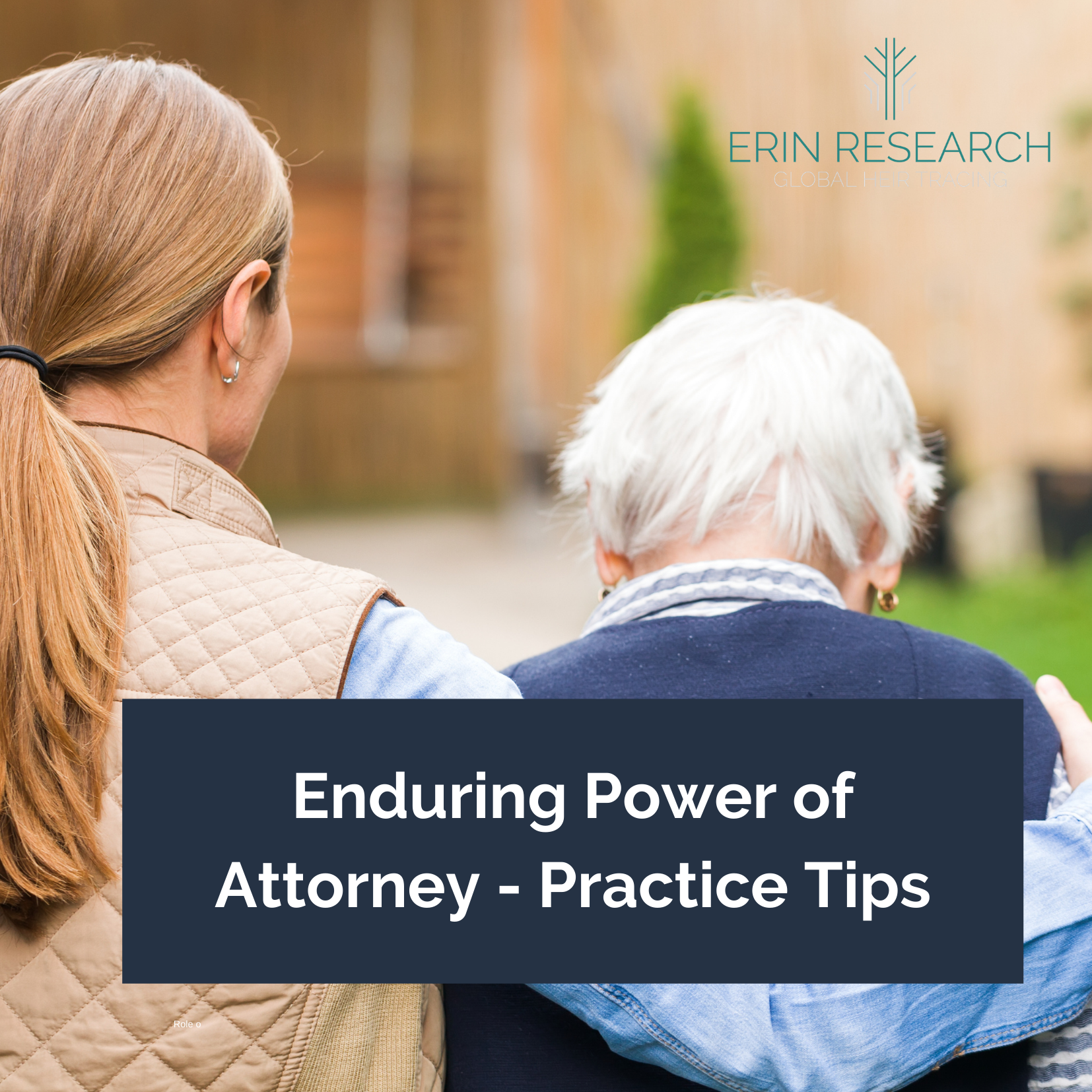11th November 2020

Erin Research regularly run webinars covering important areas of probate practice in Ireland. As professional probate genealogists, much of our work entails tracing heirs or missing next-of-kin, often in cases where a person may become incapacitated or dies intestate. In a recent webinar we looked at the enduring power of attorney – which is a legal document whereby a person sets out their preferences for who will manage their affairs should they become incapacitated. As this can be a complicated and at times fraught matter for clients, their families and solicitors alike, you may wish to watch our webinar back with David Hickey, Partner at Curry & Hickey Solicitors, a boutique firm specialising in this area. You’ll find the webinars here.
What is an Enduring Power of Attorney?
An enduring power of attorney (also known as an EPA) is a legal document whereby the donor (the person creating the EPA) chooses to appoint an attorney – usually a close family member – to look after their personal and financial affairs in the event that the donor loses mental capacity in the future. The legislative basis for enduring powers of attorney is Part 2 of the Powers of Attorney Act 1996 the Enduring Powers of Attorney Regulations 1996. The Law Society of Ireland offer an excellent set of guidelines on this topic which can be used as a checklist for EPAs.
Tips on Executing the Enduring Power of Attorney
One of the most important aspects when first meeting with a client regarding an EPA is to get as much information as possible about the client’s life, their family, the proposed attorneys and their wishes. As each family will have its own set of dynamics, having an insight into those dynamics will ensure solicitors can advise their clients on an individual basis bearing in mind the unique set of circumstances. One factor to be aware of when approached by a donor to make an EPA is the intent behind the client’s actions. In some cases a donor may wish to force their attorney(s) to behave in a particular way – for example to force an adult child to come home from living abroad. In circumstances such as these, it’s important that you have advised the client as to possible issues that may arise and to ensure to have sufficient attendances on file in case of any problems in the future.
Tip: Get as much information as you can about the client, their family and their wishes and try to understand the kind of relationship that exists between the donor and their attorneys, as well as the relationship between the attorneys themselves.
Drafting the Enduring Power of Attorney
Once you have taken full instructions from your client you then need to draft the enduring power of attorney itself. The 1996 regulations contain two templates in the first and second schedules. Most EPAs will be based on the form contained in the first schedule but if the EPA relates only to personal care decisions, the form in the second schedule should be used. For solicitors who use the legal document management system ‘Leap’, it contains a good template for general powers. The website www.enduringpower.ie is also very useful for detailed information on all aspects of the EPA. There are five parts to the enduring power of attorney.
Every EPA should consist of:
Part A – The explanatory memorandum
Part B – The section to be completed by the donor
Part C – The section to be completed by the attorney or attorneys
Part D – The section to be completed by the solicitor
Part E – The section to be completed by the registered medical practitioner
Tip: Check if your legal document management software such as LEAP contains an EPA template. Visit the website www.enduringpower.ie for useful information also.

Key elements of the Explanatory Memorandum:
- The purpose of the enduring power of attorney is to appoint a person to manage your property and affairs in the event of you becoming mentally incapable
- Where you appoint more than one attorney they can either be appointed jointly, in which case they must act together and cannot act separately, or jointly and severally in which case they can act together but they can also act separately if they wish
- A general power will include authority to sell the client’s home
- You may impose restrictions on the attorney’s powers
- You may authorise the attorney to take certain personal care decisions
- The donor must give notice of the execution of the EPA to at least two persons, one of whom must be the donor’s spouse if living or otherwise a child of the donor or any relative (note – in cases where the spouse may also be suffering from mental incapability, notice is not required)
- If your attorneys have reason to believe that you have become mentally incapable, they must apply to have the EPA registered in the High Court
- Before applying for registration, notice must be given and objections may be raised by the persons so notified including solicitors themselves
- The EPA will not come into force until it has been registered
- The attorney is obliged to keep adequate accounts of the donor’s property and affairs and to produce the account of records to the court if required and an attorney is in a fiduciary relationship with the donor
Some EPAs are straightforward and solicitors will be able to take the template and hand write in the names involved. Others may be more complicated and involve various conditions that the donor wants to insert into the EPA.
Regulation 4 of S.I. 196/1996 provides (a) the instrument shall be executed by both the donor and the attorney (who shall execute the instrument after the donor, but not necessarily on the same date), each in the presence of a witness, but not necessarily the same witness & (b) the donor shall not witness the signature of an attorney nor shall an attorney witness the signature of the donor or of another attorney. The donor should be the first person to sign the EPA. All other parties (including the registered medical practitioner) should sign on the same day or as soon as possible thereafter.
If there are any questions about the donor’s capacity in advance of drafting an EPA that should be covered off by way of a visit to the doctor but note, that is not the time when the doctor signs the EPA. The doctor only signs the EPA after the donor has signed the EPA.
Tip: The donor is the first person to sign the enduring power of attorney.
Registering the Enduring Power of Attorney with the Wards of Court Office
Registration of the EPA is mandatory once the donor has lost capacity. Section 9 (1) of the Act provides: “If the attorney under an enduring power of attorney has reason to believe that the donor is or is becoming mentally incapable, the attorney shall, as soon as practicable, make an application to the court for the registration of the instrument creating the power”. This is a key point as solicitors can often come across attorneys who are reluctant to register the EPA for various reasons. (For example, they may be of the view that it’s unnecessary as they are already performing their duties as attorney on behalf of the donor or they are worried about going to court in the first place). However, under the 1996 Act, attorneys don’t have a choice once there is medical evidence to suggest the donor is or is becoming mentally incapable. An EPA is not valid until it has been registered.
Notice of intention to apply for registration should be in the form contained in the fourth schedule of the regulations and in essence, notice must be given to:
- the donor
- those persons who were notice parties to the execution of the EPA, and
- the Wards of Court Office. If all the notice parties are dead or mentally incapable or their whereabouts cannot be reasonably ascertained, then notice must be given to the relatives (if any) who are entitled to receive notice by virtue of paragraph 3 of the first schedule of the 1996 Act.
In conclusion, practitioners should try to ensure donors know and trust their appointed attorneys to the greatest extent possible and that they should have objective evidence for such beliefs. Donors should be advised that an EPA is not a device for controlling the attorney’s behaviour after the donor becomes mentally incapable. Where joint attorneys are appointed and relations are in any way strained, donors should be advised of the possibility of significant issues arising, the matter coming before the court and in some cases, the donor being taken into wardship.
To view our webinar on this topic and to listen to case studies from David Hickey view here. For more or to get in contact with David see Curry & Hickey Solicitors, Dublin.